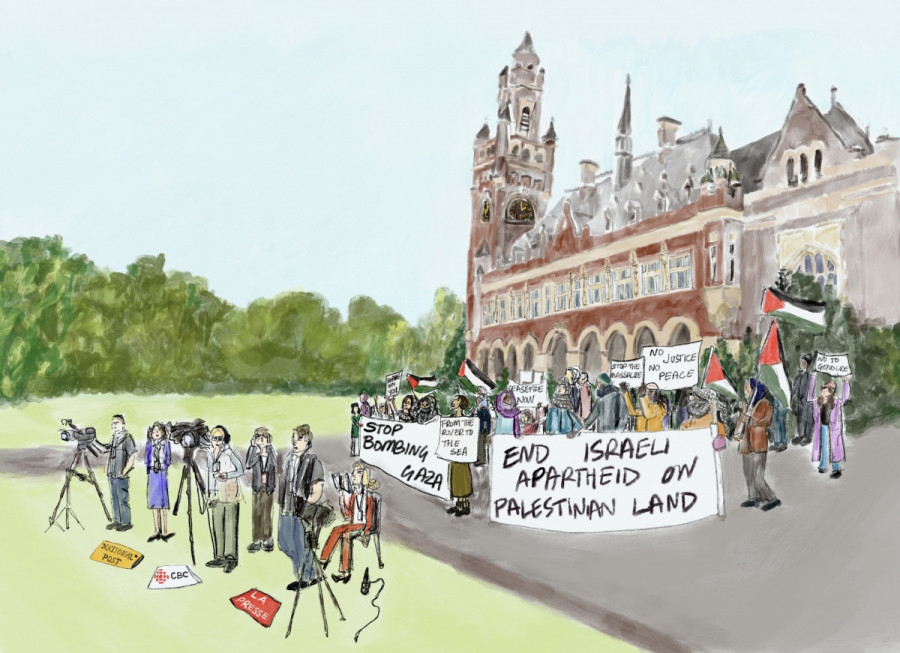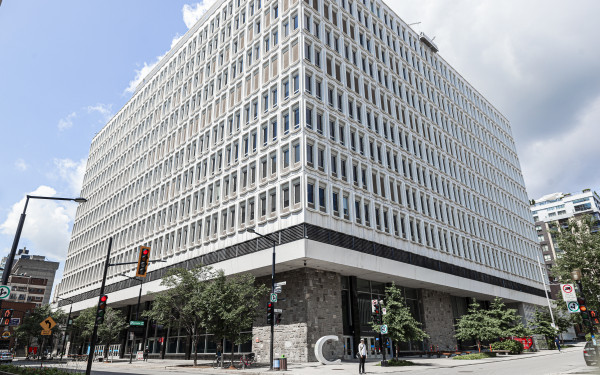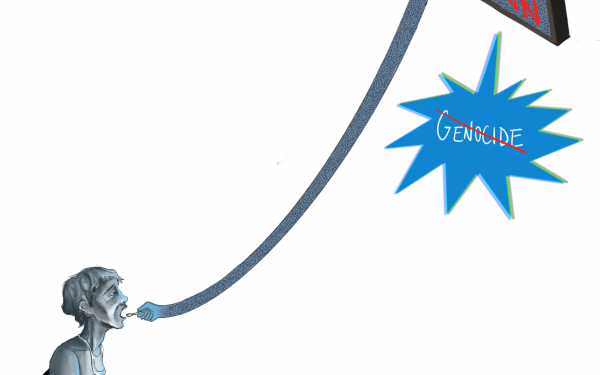Reframing Genocide
Analyzing the influence of national narratives on Canadian perceptions of the ICJ’s proceedings
On Jan. 11, the South African delegation appeared in front of the International Court of Justice (ICJ) in the Hague. They brought forth a case highlighting the ongoing genocide against Palestinians by the state of Israel, citing articles under the Geneva Convention and arguing that for the last 75 years, Israel has engaged in discriminatory behaviour against Palestinians under international law.
The Court set a preliminary ruling of the case on Jan. 26. It ordered Israel to report back in 30 days with the measures they have taken to limit the casualties. The Court exhorted that Israel must do everything in its power to prevent the impact of their campaign and provide aid to Palestinians.
However, the Court ruling is limited to the enforcement of the Security Council.
The genocide in Gaza has once again brought to the limelight that media coverage regarding Palestinians is dismissive and lacklustre. At every opportunity, the Israeli narrative, the Israeli evidence, the Israeli victim is viewed as trusted, factual and believed. However, the same sentiment is not extended to Palestinians. The word “alleged” appears too often in headlines and the necessity of tempered reporting is urged at the mention of Palestinians.
Canadian coverage in particular has been predominantly sympathetic to the state of Israel and defensive of crimes committed by the Israeli military. To cite the Canadian for Justice and Peace in the Middle East (CJPME): “Israelis are killed, Palestinians are dead.”
Legacy papers such as the National Post have attempted to refute any accusations against Israel by accusing the ICJ of partaking in “political persecution.” They have been parroting the narrative that the case against Israel by South Africa serves as a proxy to Russian or Chinese interests. They go as far as to call them the legal arm of Hamas.
Similarly, recent CBC news articles have mainly reflected Israel’s position in the ICJ case. The CBC has repeatedly been called out for the use of the term “Palestinian Territories” when referring to Palestine or historic Palestine, as set out in the guidelines of the Journalistic Standard and Procedures of the CBC. By using this term, it effectively engages in legitimizing Israel by refuting that there has ever been a Palestinian state.
The Globe and Mail also published an article by the former Justice of the Supreme Court, Rosalie Abella, in which she argued that putting Israel on trial is an abuse of the international legal system that was established following the Holocaust.
She declared it a legal absurdity to accuse Israel of genocide when Hamas’ ethos is the destruction of the Jewish state. By doing so, she deflects and conveniently leaves out that Hamas was a creation of Israel as admitted by a former Mossad official, Avner Cohan. She bemoans the fact that the Genocide Convention, established following the Holocaust, is being used to describe the Palestinians’ plight.
Instead, she argues that Israel’s Supreme court should judge the matter, declaring it as a “global justice leader.” Should the country that is facing accusations of genocide against Palestinians be the sole judge of its actions?
Abella brings to light that looking for accountability is a myth in the realm of the international order. The implications are dire, as it is the responsibility of these institutions to uphold international law established following the Holocaust. By doing so, she strips the very value and reason as to why they were established in the first place, leaving no avenue for the Palestinians but to address Israel in their own court.
Due to the pitiful quality, content and the measures taken to discredit any voice in opposition to Israel, the Canadian citizen is abandoned by our very own press standards. Canadian newsrooms have actively failed to abide by their journalistic standards and duties, by decontextualizing events, platforming pro-Zionist coverage and by failing to promote nuanced voices.
The blatant bias displayed by Canadian media agencies has not only fueled a rise in Islamophobia but also in antisemitism. This bias stems from a refusal to acknowledge that the way media frame issues carries significant political implications. Recognizing and acting responsibly in light of these implications is crucial, as failing to do so puts everyone at risk.
This article originally appeared in Volume 44, Issue 9, published January 30, 2024.







_600_375_90_s_c1.jpg)